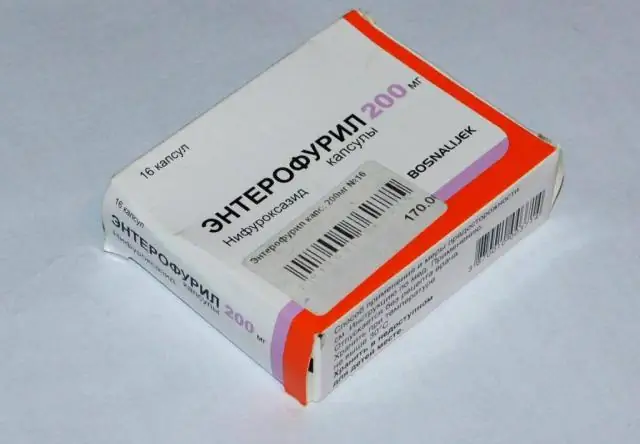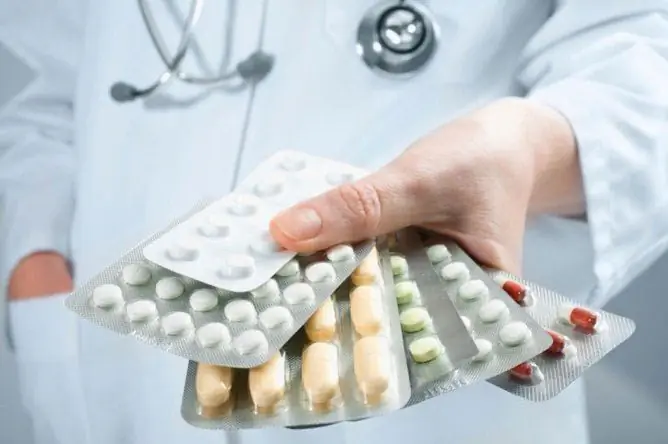- Author Rachel Wainwright [email protected].
- Public 2023-12-15 07:39.
- Last modified 2025-11-02 20:14.
Iprozhin
Iprozhin: instructions for use and reviews
- 1. Release form and composition
- 2. Pharmacological properties
- 3. Indications for use
- 4. Contraindications
- 5. Method of application and dosage
- 6. Side effects
- 7. Overdose
- 8. Special instructions
- 9. Application during pregnancy and lactation
- 10. In case of impaired liver function
- 11. Drug interactions
- 12. Analogs
- 13. Terms and conditions of storage
- 14. Terms of dispensing from pharmacies
- 15. Reviews
- 16. Price in pharmacies
Latin name: Iprozhin
ATX code: G03DA04
Active ingredient: Progesterone (Progesterone)
Producer: Catalent France Beinheim SA for Laboratoires Effik (France)
Description and photo update: 19.10.2018
Prices in pharmacies: from 247 rubles.
Buy

Iprozhin is a hormone therapy drug, a gestagen.
Release form and composition
Dosage form - capsules: almost white or white, ovoid, with a soft structure; inside capsules - a white or almost white thin suspension (dosage 100 mg: in a blister 30 pcs., in a carton box 1 or 3 blisters, in a blister pack 15 pcs., in a carton box 2 or 6 blisters; dosage 200 mg: in a blister pack 15 pcs.., in a cardboard box 1 or 3 blisters).
1 capsule contains:
- active substance: micronized progesterone - 100 mg or 200 mg;
- auxiliary components: soy lecithin, peanut butter;
- capsule shell: glycerol, titanium dioxide, gelatin.
Pharmacological properties
Pharmacodynamics
Gestagen is a hormone of the corpus luteum. Penetrating into the nucleus, after binding to receptors on the surface of cells of target organs, it activates DNA (deoxyribonucleic acid) and stimulates the synthesis of RNA (ribonucleic acid). It promotes the transformation of the uterine mucosa from the proliferation phase caused by the follicular hormone into the secretory phase, then, after fertilization, the transition to the state necessary for the further development of the zygote.
Progesterone reduces the excitability and contractility of the muscles of the uterus and fallopian tubes, stimulates the development of the terminal elements of the mammary gland.
Stimulation of protein lipase contributes to an increase in fat storage, glucose utilization, stimulated and basal insulin concentration, causes the accumulation of glycogen in the liver, and an increase in aldosterone production. Low doses of gestagen accelerate the production of pituitary gonadotropic hormones, and high doses suppress it. The drug increases the excretion of nitrogen in the urine, reducing azotemia. Against the background of its intake, the endometrium develops normally, the growth of the secretory department of the mammary acini and lactation is activated.
Pharmacokinetics
The drug is well absorbed into the gastrointestinal tract after oral administration, the maximum concentration in the blood is reached after 1-3 hours. After taking Iprozhin 200 mg, the concentration of progesterone in plasma increases from 0.13 ng / ml: after 1 hour - up to 4.25 ng / ml, after 2 hours - up to 11.75 ng / ml, after 3 hours it is 8.37 ng / ml, after 6 hours - 2 ng / ml, after 8 hours - 1.64 ng / ml.
With intravaginal use, it is absorbed quickly, after 1 hour a high concentration of progesterone is observed in the plasma, which reaches its maximum after 2-6 hours. With the introduction of Iprozhin 200 mg per day (twice 100 mg), the average concentration within 24 hours is 9.7 mg per 1 ml. The administration of a dose of more than 200 mg provides a progesterone concentration level corresponding to the first trimester of pregnancy.
The connection with plasma proteins is 90%.
Progesterone metabolism occurs in the liver with the participation of the CYP2C19 enzyme system. The main metabolites are 20-alpha-hydroxy-delta-4-alpha-pregnanolone and 5-alpha-dihydroprogesterone. About 50-60% of Iprozhin is excreted through the kidneys.
Indications for use
According to the instructions, Iprozhin is indicated for the treatment of the following pathologies:
- premenstrual syndrome;
- premenopause;
- fibrocystic breast disease;
- hormone replacement therapy in postmenopausal women - as a gestagen component in the complex therapy with estrogens.
Intravaginal capsules are prescribed in such cases:
- preparation period for in vitro fertilization (IVF) to support the luteal phase;
- endocrine infertility;
- complete absence of progesterone (egg donation) - as hormone replacement therapy for non-functioning (absent) ovaries;
- prevention of uterine fibroids;
- support of the luteal phase in a spontaneous or induced menstrual cycle;
- premature menopause, postmenopause (in combination with estrogens);
- endometriosis;
- prevention of habitual and threatening miscarriage against the background of gestagenic insufficiency.
Contraindications
- vaginal bleeding of unknown origin;
- acute forms of thromboembolic diseases or phlebitis;
- predisposition to thrombosis;
- incomplete abortion;
- malignant neoplasms of the genitals and mammary glands, including if they are suspected;
- porphyria;
- hypersensitivity to the components of the drug.
Caution should be exercised when prescribing Iprozhin to women with arterial hypertension, diseases of the cardiovascular system, chronic renal failure, bronchial asthma, diabetes mellitus, epilepsy, depression, migraine, hyperlipoproteinemia and during breastfeeding.
Capsules should be taken inside with caution in patients with severe liver dysfunction.
Instructions for use of Iprozhin: method and dosage
The capsules are intended for oral administration and intravaginal use.
Inside the drug is taken once a day, in the evening, just before going to bed. Do not take before, during or after meals.
Recommended dosage:
- premenstrual syndrome, premenopause, fibrocystic breast disease, dysmenorrhea: from 17 to 26 days of the menstrual cycle - 200-300 mg each;
- hormone replacement therapy in postmenopausal women in combination with estrogens: 200 mg, course duration 10-12 days.
The clinical effect depends on strict adherence to the indicated dosage regimen, if it does not contradict the individual doctor's prescription.
Recommended dosage for intravaginal administration of the drug:
- hormone replacement therapy for non-functioning (absent) ovaries (egg donation) in combination with estrogen therapy: on days 13 and 14 of the cycle - 100 mg per day, from 15 to 25 days of the cycle - 100 mg 2 times a day, from day 26 and when determining pregnancy - the dose is increased every week by 100 mg per day, after reaching the maximum dose of 600 mg, it is taken 3 times a day for 60 days;
- support of the luteal phase during the IVF cycle: from the day of injection of chorionic gonadotropin (CG) - 400-600 mg per day, during the entire period up to 12 weeks of pregnancy;
- support of the luteal phase in the spontaneous or induced menstrual cycle and in infertility associated with dysfunction of the corpus luteum: from the 17th day of the menstrual cycle - 200-300 mg per day for 10 days. Treatment should be continued if menstruation is delayed and pregnancy is determined;
- threat or prevention of abortion: daily - 100-200 mg 2 times a day until 12 weeks of pregnancy. The duration of use depends on the nature and characteristics of the patient's condition.
Side effects
Transient dizziness is possible 1-3 hours after the use of Iprozhin. In addition, the drug can cause the development of allergic reactions, drowsiness, shortening of the menstrual cycle, breakthrough bleeding.
Overdose
Overdose symptoms are: drowsiness, dizziness, breakthrough bleeding.
For the treatment of the condition, it is necessary to reduce the dose of the drug.
special instructions
The drug is not a contraceptive, so it cannot be used for contraception.
Influence on the ability to drive vehicles and complex mechanisms
During the period of taking the capsules inside, care must be taken when performing types of work associated with the risk of increased injury, including driving vehicles and other mechanisms, since during therapy it is possible to reduce the concentration of attention and the speed of psychomotor reactions.
Application during pregnancy and lactation
Due to the risk of liver dysfunction during pregnancy, the drug should be used with caution.
During lactation, Iprozhin is prescribed with caution.
If liver function is impaired
It is recommended to use capsules orally with caution in women with severe liver dysfunction.
Drug interactions
With the simultaneous use of Iprozhin:
- diuretics, antihypertensive drugs, anticoagulants, immunosuppressants - enhance their effect;
- oxytocin - reduces the lactogenic effect.
Analogs
Iprozhin's analogs are capsules: Prajisan, Utrozhestan; gels: Progestogel, Crainon.
Terms and conditions of storage
Keep out of the reach of children.
Store at temperatures up to 25 ° C, protected from moisture and light.
The shelf life is 3 years.
Terms of dispensing from pharmacies
Dispensed by prescription.
Reviews about Iprozhin
Reviews of Iprozhin with intravaginal use are mostly positive. Speaking about its advantages, the patients especially note the absence of leakage, since there is no oil base in the composition of the drug, and the extremely rare cause of thrush. When taking the capsules inside, there were complaints about such side effects as drowsiness throughout the day, a feeling of fatigue, and increased blood pressure.
Price for Iprozhin in pharmacies
The price of Iprozhin 200 mg (15 capsules per pack) from 412 rubles, 100 mg (30 capsules per pack) from 376 rubles.
Iprozhin: prices in online pharmacies
|
Drug name Price Pharmacy |
|
Iprozhin 100 mg capsules 30 pcs. 247 r Buy |
|
Iprozhin 200 mg capsules 15 pcs. 278 r Buy |
|
Iprozhin capsules 100mg 30 pcs. 296 r Buy |
|
Iprozhin capsules 200mg 15 pcs. 333 r Buy |

Maria Kulkes Medical journalist About the author
Education: First Moscow State Medical University named after I. M. Sechenov, specialty "General Medicine".
Information about the drug is generalized, provided for informational purposes only and does not replace the official instructions. Self-medication is hazardous to health!






